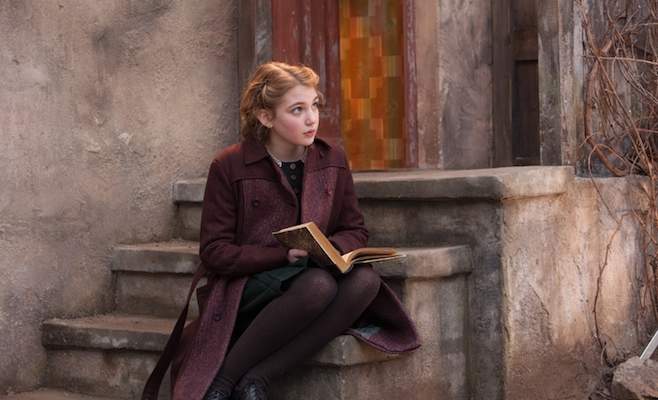The Book Thief
A young girl attempts to make sense of the senseless.
Overview
Death is everywhere in The Book Thief: sometimes shown, usually implied and — every so often — speaking as its narrator. There is death in the film's opening scene, and there is death again at its end, yet early denunciations have labelled it 'Holocaust lite' or 'Holocaust kitsch', with one critic going so far as to call it "a preposterously sanitised portrait of hardship and war".
If these criticisms (of which there have been many) were to be distilled into one pure, refined quibble, it would be that The Book Thief is simply too nice for a story that, at least in part, touches upon the Holocaust. Is it Schindler's List? No, but let's be clear: it's not even remotely trying to be.
Directed by Brian Percival (Downton Abbey), this is a PG film, based on a young adult novel and told from the perspective of a 13-year-old German girl. Neither the bestselling book by Markus Zusak nor the film adaptation ever set out to tell the same old conventionally harrowing and affecting war narrative, because — presumably — that story has already been told so many times before. Instead, it presents the moving, imaginative and even charming tale of a child's profound love of literature and its ability to transport, enlighten, incriminate, incite and inspire its reader.
That child is Liesel Meminger (Sophie Nelisse), who's put up for adoption after her communist mother is forced to flee the Nazi purge. Liesel's brother dies en route to their new home with the elderly Hubermanns (Geoffrey Rush and Emily Watson), and from the outset it's clear she has an ally in the playful Hans and a challenge in his irascible wife Rosa. She also quickly befriends her snowy-haired neighbour and champion runner Rudy (Nico Liersch), whose idolisation of African-American sprinter Jesse Owens places him at odds with local the Nazi Party officials.
Most importantly, though, Liesel begins to learn how to read, and together with Hans she quickly discovers the infinite joys and rewards to be found in books. Her first is picked up on the day of her brother's funeral, the next, rescued from the ashes of a book burning event. Each book tells a story, yet also has a story of its own, and none more so than the copy of Mein Kampf possessed by Max (Ben Schnetzer), a Jewish man kept safe and hidden by the Hubermanns.
Which brings us again to the accusation of 'Holocaust kitsch'. Max's torment is prolonged and palpable, drifting close to death on multiple occasions through exhaustion, malnourishment, exposure and the unremitting threat of discovery. Worst of all, he spends — quite literally — years living in the Hubermanns' basement without even a single opportunity to breathe fresh air or once see the sky. Had The Book Thief been told from his perspective, it would have been every bit the despairing and wretched tale so many apparently seek, yet it would not have been the tale told to Zusak by his grandparents and which he, in turn, wished to tell the world.
If many of these critics are to be believed, the only way you're permitted to tell a Holocaust story is through bleak imagery, solemn dialogue and a complete lack of tenderness. The Book Thief, much like 1997's Life Is Beautiful, offers a different perspective. Through the extraordinarily talented Nelisse, we see a scared, confused and compassionate girl attempting to make sense of the senseless. The horrors befalling so many around her aren't explicitly shown, but our knowledge of them, matched with the meticulously recreated settings, contributes to a beautiful and largely original tale of one family's bravery, decency and humanity.





